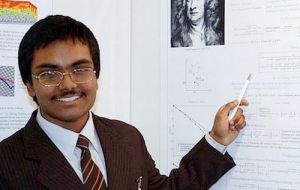MercoPress. South Atlantic News Agency
Indian school boy solves 350-year old mathematical problem set out by Newton
 Shouryya Ray: “I just asked myself, 'Why not?'”
Shouryya Ray: “I just asked myself, 'Why not?'” An Indian school boy from Calcutta and currently in Germany, Shouryya Ray, has shocked everyone by solving a 350-year-old mathematical problem which was set by one of the greatest scientists and mathematicians, Sir Isaac Newton.
The 16-year-old boy living in from Dresden has been called “genius” after solving two fundamental particle dynamics theories. Physicists have previously cracked these problems only with the help of powerful computers.
Ray's solutions will now help scientists to calculate the flight path of a thrown ball and also it will help them to predict how it will strike and bounce off a wall, Die Welt newspaper reported. Previously it had only been possible to estimate this using a computer.
Ray first came across the problem when his professors said that they were un-crackable during a school trip to Dresden University.
But when he saw the problem he realized that the present method could not get an exact result, and then he decided to solve the problem.
“I just asked myself, 'Why not?',” Ray told the Die Welt paper. “I didn't believe there couldn't be a solution,” he added.
According to the report, Ray was fascinated by the ‘intrinsic beauty’ of maths since an early age. He was inspired by his father, Subhashis Ray, an engineer who works as a research assistant at the Technical University of Freiburg and who began setting him arithmetic problems at the age of six
Ray recently won a youth science competition at the state level in Saxony and won second place in the Math and IT section at the national final.
Ray who hails from Calcutta arrived in Germany four years ago. When he came to Germany he was not able to speak the German language, but now he is fluent in that language.
His intelligence was quickly noted by his school teachers and was moved up two years in school and at present he is sitting his Abitur exams two years early.
But Ray doesn’t think he’s a genius, and told Die Welt he has weak points as a mathematician, as well as in sports and social sciences.
Ray, whose recent breakthrough may have earned him a paragraph in the schoolbooks of the future, is currently deciding whether to study maths or physics at university.




Top Comments
Disclaimer & comment rules-

-

-

Read all commentsI love physics but hate maths. The trouble is that maths is the language of physics rather than pretty pictures of galaxies etc.
May 31st, 2012 - 06:57 pm 0To be a true master of Physics you have to master the maths - and few can do both. Ed Witten is the only one alive today that is Nobel Prize standard at both.
I'll just have to carry on pretending I understand the logic behind their theories - note the article above doesn't even try to explain it.
I am with you on the maths.
May 31st, 2012 - 07:38 pm 0As a retired Profesional Engineer I look back and think - thank the stars I never did maths beyond the needs of my science training and of course, statistics.
2 ChrisR “As a retired Profesional Engineer I look back and think - thank the stars I never did maths, geography nor history”
May 31st, 2012 - 08:47 pm 0We know that already Chris.
Commenting for this story is now closed.
If you have a Facebook account, become a fan and comment on our Facebook Page!